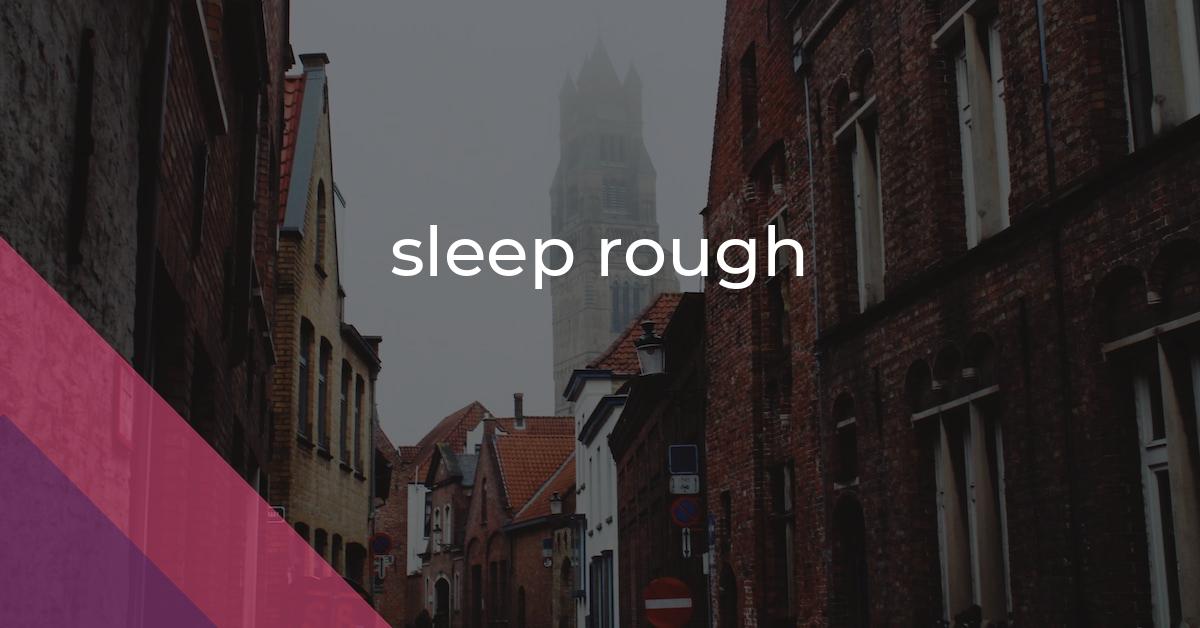sleep rough: Idiom Meaning and Origin
What does ‘sleep rough’ mean?
The idiom "sleep rough" means to sleep outside or in an uncomfortable place, typically due to a lack of housing or homelessness.

Idiom Explorer
An idiom that means someone is very poor and has no money.
The idiom "take a nap" means to have a short sleep during the day, typically lasting for a brief period of time.
The idiom "sweat bricks" means to feel extremely nervous, anxious, or scared, often due to a stressful or intense situation.
The idiom "sleep with the fishes" means to be killed or murdered, often by being thrown into a body of water. It is a euphemism that originated from Mafia culture and is used to imply a violent and permanent end.
The idiom "sleep with" means to have sexual relations with someone. It is a euphemistic phrase used to describe intimacy or a romantic relationship in a figurative sense.
The idiom "sleep together" means to have sexual intercourse. It is a euphemistic expression that refers to the act of two people sharing a bed for sexual activity.
The idiom "sleep in" means to stay in bed later than usual, often to rest or relax. It implies delaying or skipping one's normal morning routine or obligations.
The idiom "sleep camel" refers to a situation where one person takes on the burden or responsibility of another person, typically out of kindness or obligation, allowing the other person to relax or avoid work. This idiom draws a parallel between the act of carrying heavy loads on a camel's back and someone taking on someone else's troubles or responsibilities.
The idiom "sleep a wink" means to not sleep at all or to be unable to fall asleep; suggests a lack of rest or relaxation.
Hidden tales uncovered: historical roots of "sleep rough"
Sleep rough is an idiom that originated in the United Kingdom and is primarily used in British English. It describes the act of sleeping outside, particularly in public spaces, without a permanent or comfortable shelter. It is also commonly used to refer to the experience of homelessness and the hardships faced by those who are unable to secure proper housing.
The origins of the idiom are unclear, but it is believed to have emerged in the mid-20th century. The term "rough" in this context likely refers to the uncomfortable and inhospitable conditions endured by those who sleep rough. It may have been influenced by British slang, where "rough" is used to describe something unpleasant or difficult.
Sleep rough is a metaphorical expression that symbolizes the struggle of individuals who are forced to spend their nights without the basic comforts and security of a home. It highlights the vulnerability and precariousness of those who find themselves in such circumstances, often facing various dangers and challenges.
The idiom has gained significant attention and usage in recent years due to the social issue of homelessness. It has become a part of public discourse, activism, and media discussions, helping to shed light on the plight of the homeless population and the need for effective solutions.
While sleep rough is primarily used in the United Kingdom, its usage has spread to other English-speaking countries, including the United States. However, it still remains less common in American English compared to British English.
Given the evocative nature of the idiom, it is not surprising that it has also found its way into various forms of literature, including novels, poetry, and song lyrics. Its usage in these creative works further underscores the emotional weight associated with the experience of sleeping rough.
One related idiom is "rough sleeper," which is often used interchangeably with sleep rough. It refers to a person who regularly sleeps outside without a permanent or comfortable shelter. The term "rough" in this idiom emphasizes the harsh and difficult conditions that these individuals face.
Another related idiom is "camp out," which can be used to describe the act of sleeping rough. It conveys the idea of temporarily setting up a makeshift camp or sleeping arrangement outdoors. This can be done in parks, alleyways, or other public spaces.
"on the street" is another related idiomatic phrase that is often used in conjunction with sleep rough. It refers to the act of living or sleeping outside, typically on sidewalks or in other public areas. It highlights the literal placement of individuals who are experiencing homelessness on the streets.
A phrase that can be associated with sleep rough is "rough sledding." This idiomatic expression is often used to describe a difficult or challenging situation. It can be applied metaphorically to the struggles and hardships faced by those who sleep rough, emphasizing the tough circumstances they endure.
"sleep in" is another related phrase that can be used to describe the act of sleeping rough. It conveys the idea of sleeping late or staying in bed, but in the context of sleep rough, it refers to the lack of a proper bed or shelter and the need to sleep wherever one can find a place, even if it is outside.
Sleep rough is an idiom that vividly captures the distressing experience of sleeping outside without proper shelter. It serves as a poignant reminder of the hardships faced by the homeless and continues to spark discussions about the urgent need for solutions to address this societal problem.
Example usage
Examples of how the idiom "sleep rough" can be used in a sentence:
- After losing his job and home, Mark had to sleep rough on the streets.
- The hiker missed the last bus and had no choice but to sleep rough in the woods.
- During the camping trip, we decided to sleep rough under the stars instead of using tents.
More "Homelessness" idioms



